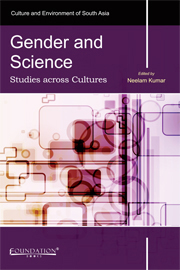Book contents
- Frontmatter
- Contents
- List of Contributors
- Acknowledgements
- Introduction: Reflections and Realities across Cultures
- Section I Approaches and Perspectives
- Section II Illustrative Examples
- 6 Women and Science in the Netherlands: A Dutch Case
- 7 Japanese Women Scientists: Trends and Strategies
- 8 Saudi Women: Their Role in Science and Education
- 9 Changing the Facts: Gender Dimensions of the South African Public Science System
- 10 Demographic Inertia and the Glass Ceiling in American Science (1979–2000)
- 11 Women in Science in France
- 12 Women and Science: Issues and Perspectives in the Indian Context
- Conclusion: The Persistent Patterns!
- Bibliography
- Index
12 - Women and Science: Issues and Perspectives in the Indian Context
from Section II - Illustrative Examples
Published online by Cambridge University Press: 05 May 2013
- Frontmatter
- Contents
- List of Contributors
- Acknowledgements
- Introduction: Reflections and Realities across Cultures
- Section I Approaches and Perspectives
- Section II Illustrative Examples
- 6 Women and Science in the Netherlands: A Dutch Case
- 7 Japanese Women Scientists: Trends and Strategies
- 8 Saudi Women: Their Role in Science and Education
- 9 Changing the Facts: Gender Dimensions of the South African Public Science System
- 10 Demographic Inertia and the Glass Ceiling in American Science (1979–2000)
- 11 Women in Science in France
- 12 Women and Science: Issues and Perspectives in the Indian Context
- Conclusion: The Persistent Patterns!
- Bibliography
- Index
Summary
The analyses of science from sociological, philosophical, and historical perspectives show that it is socially and culturally constructed in a large measure, and the norms and values of society and scientists reflect in the representation of knowledge. Ideologies of gender, nature, and science that arose in the seventeenth century supported the increasing split between a man's and women's worlds and between the public and private spheres; and supported the exclusion of women from intellectual pursuits such as science. According to feminists, sociologists of scientific knowledge have been slower to recognise that science and technology reflect and reinforce the interests of patriarchy (Harding, 1986). Various studies and surveys done in sociology of science have substantiated that women have neither received sufficient opportunities to be a part of science nor have they got the due credits for their contribution towards the progress of science (Eisenhart and Finkel, 1988; Rose, 1994; Wenneras and Wold, 1997). Women's studies in the 1970s seeking to understand the roots of women's subordination pointed out biology, gender socialisation, economy, sexual division of work, and so on, as various reasons for it. In the 1980s, feminist theorising increasingly questioned the androgynous model of human nature. It aimed at recovering women's culture and critiqued masculine ideology by pointing to the interconnections between women's subordination and the destruction of the environment (Poonacha, 2003). They also highlighted the fallacy of gender-neutrality of science and brought out the gendered norms within the culture and practice of science which act to the detriment of women in general, and women scientists in particular.
- Type
- Chapter
- Information
- Gender and ScienceStudies across Cultures, pp. 264 - 292Publisher: Foundation BooksPrint publication year: 2012

